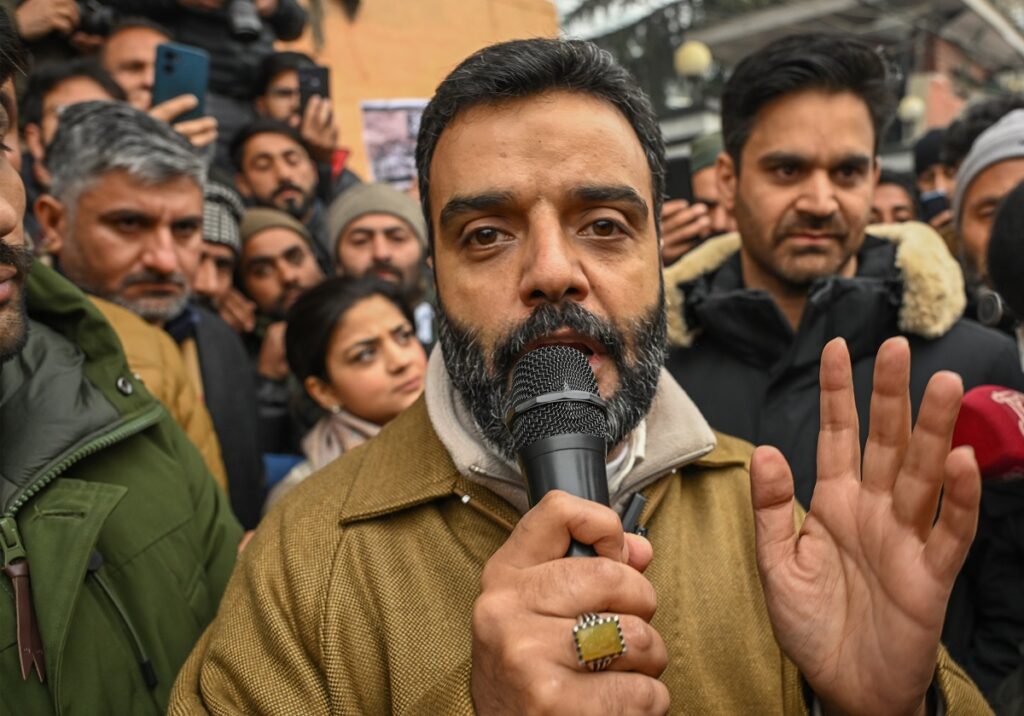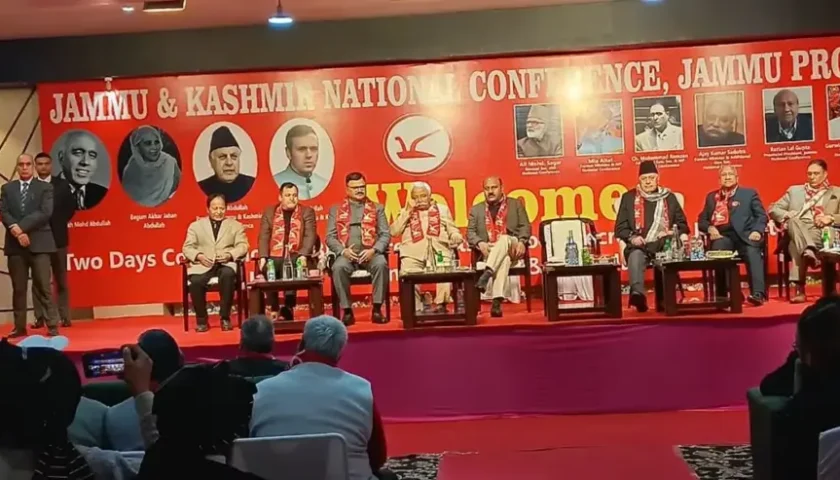Aga Ruhullah Mehdi vs National Conference: Inside the Growing Rift Over Mandate, Ideology, and Kashmir’s Political Future
By: Javid Amin | 27 November 2025
A Storm Within the National Conference
The National Conference (NC), one of Jammu & Kashmir’s oldest and most influential political parties, is confronting an emerging internal challenge. Member of Parliament from Srinagar and influential Kashmiri Shia cleric-politician Aga Ruhullah Mehdi has launched a pointed critique of his own party’s top leadership — accusing them of abandoning the 2024 mandate, shifting from core ideological commitments, and failing to hold the government accountable on crucial issues.
Ruhullah’s remarks, unusually sharp and unfiltered, have opened a broader conversation about the NC’s direction, internal dynamics, and its relationship with the electorate. His exclusion from the party’s Central Working Committee (CWC) meeting — something he says “has never happened since 2002” — has only deepened the conversation around factional tensions and ideological drift.
This long-form feature unpacks the layers behind this controversy:
-
the political roots of Ruhullah’s anger,
-
the ideological journey of the NC post-2024 elections,
-
the social implications among the Kashmiri electorate, and
-
the security and governance lens through which these developments are viewed.
The Political Angle
The Exclusion That Sparked the Storm
When Ruhullah publicly revealed that he was not invited to the NC’s Central Working Committee meeting, it shocked many within political circles.
For decades, Ruhullah has been one of the central Kashmir region’s strongest voices — respected for his grassroots connect and uncompromising stand on Kashmir’s political identity. His assertion that this was the first time since 2002 that he had been left out of a key NC meeting suggested intentional marginalisation.
This was not a random administrative oversight; it was widely interpreted as a signal that parts of the leadership now see him as a voice challenging the party line.
Why the exclusion matters
-
The CWC is the NC’s most important decision-making body.
-
Excluding a prominent MP disrupts the party’s image of internal democracy.
-
It hints at growing discomfort with Ruhullah’s ideological rigidity.
-
It emboldens those within the party who feel NC is drifting from its roots.
Ruhullah has now positioned himself as someone outside the inner power circle but still deeply rooted in the public mandate.
The Clash Over Article 370: “The People Voted Us for a Reason”
At the heart of Ruhullah’s criticism lies the NC’s stand on Article 370 and statehood.
During the 2024 elections, NC leaders campaigned aggressively on restoring constitutional protections for Jammu & Kashmir. It was their central promise. Ruhullah points out that the electorate granted them their mandate based on this commitment.
His critique is blunt:
-
NC has softened its Article 370 narrative after the election.
-
Leaders have “shifted rhetoric” to a more diluted language.
-
The party is no longer articulating the strong legal and constitutional fight it promised.
-
The leadership is “accommodating” narratives similar to those used by the BJP.
To Ruhullah, this is nothing short of political betrayal of a deeply emotional issue.
The stake of Article 370 in NC’s identity
For decades, NC’s political identity rested on:
-
Defending Kashmir’s autonomy
-
Advocating for constitutional protections
-
Representing the aspirations of JK’s unique historical and cultural context
Any softening of these positions risks eroding NC’s base. Ruhullah is positioning himself as the guardian of the party’s original ideological promise.
“NC Is Speaking the BJP’s Language” — Rhetorical Shift or Ideological Drift?
One of Ruhullah’s sharpest accusations is that NC leaders have begun adopting BJP-like rhetoric — a jarring claim given the ideological poles the two parties occupy.
Ruhullah argues that NC has:
-
Started using softer phrasing that legitimises the post-2019 status quo
-
Avoided confrontational political vocabulary
-
Moved from resistance-based messaging to accommodation-based messaging
-
Reduced mention of constitutional autonomy, identity, and political guarantees
He is essentially arguing that NC, in an attempt to remain politically viable, is aligning its tone with the dominant national narrative.
What this indicates politically
-
The party may be seeking tactical moderation to avoid confrontation with the Centre.
-
Leadership may believe softer language improves chances of negotiation.
-
Internal calculations may prioritise stability over ideological rigidity.
-
Ruhullah fears this shift weakens the foundational political identity of Kashmir.
His dissent is therefore positioned as a corrective force, reminding the leadership of the mandate it was given.
Internal Tensions: Power Centres and Personality Politics
Ruhullah’s critique is significant because he represents:
-
A strong Kashmir Valley constituency
-
A popular grassroots connection
-
A loyal cadre base in central Kashmir
-
A clear ideological stance
His exclusion from the Working Committee suggests a struggle between:
-
Pragmatic moderates within NC
-
Ideological purists like Ruhullah
This internal struggle is not new for political parties, but in Kashmir’s sensitive political climate, such rifts carry greater significance.
Possible reasons behind sidelining
-
Leadership may see Ruhullah’s firm Article 370 stance as inconvenient.
-
His independent public speaking style challenges the communication narrative.
-
His popularity could threaten existing power balances.
-
His ideological rigidity may be viewed as politically risky.
These dynamics indicate that the NC is dealing with a identity-versus-pragmatism conflict.
The Social Angle
Reading the Public Mood: Why Ruhullah’s Words Resonate
Among large segments of Kashmir’s population — especially the youth — there is a sense of political disillusionment and uncertainty post-2019.
Ruhullah’s strong ideological stance appeals to:
-
those who believe political parties must remain committed to pre-2019 identity
-
those who distrust political moderation
-
those who view softening of Article 370 messaging as political abandonment
-
communities that feel unheard or sidelined
By positioning himself as a voice of authentic representation, Ruhullah taps into a social sentiment that values consistency and ideological courage.
Grassroots Engagement: “I Meet People in Tulmulla, Ganderbal Regularly”
Ruhullah emphasised his continued engagement with citizens — particularly in areas like Tulmulla, Ganderbal. This is politically significant.
Why?
Grassroots presence:
-
reinforces his image as a responsive leader
-
keeps him closer to the electorate’s lived experiences
-
helps him channel public grievances to authorities
-
strengthens his moral position against the leadership’s supposed detachment
At a time when voters often feel distanced from their representatives, his emphasis on listening and public meetings positions him as a people-first politician.
What People Expected: Mandate and the Feeling of Betrayal
Ruhullah’s argument that the NC is “disconnecting from the people” resonates because many voters supported NC for:
-
Restoration of statehood
-
Legal fight for Article 370
-
Protection of community rights
-
Release of political detainees
-
Accountability in governance
-
Protection of religious and cultural freedoms
If the NC appears to sideline these issues, it risks eroding trust.
Social consequences of perceived mandate betrayal
-
Voter disillusionment
-
Decline in political participation
-
Weakening loyalty towards mainstream parties
-
Increased fragmentation of Kashmir’s political landscape
Ruhullah’s critique becomes a reflection of public dissatisfaction, not just intra-party dissent.
The Legislative & Governance Angle
Silence on Waqf Amendment Bill: A Turning Point?
Ruhullah’s criticism of NC’s muted stance on the Waqf amendment bill is another focal point of his discontent.
He argues:
-
The bill impacted community rights
-
NC should have mounted a stronger legislative resistance
-
Silence on such issues damages the party’s credibility
-
Leaders failed to defend religious and cultural autonomy
This is not merely a legislative criticism; it is a moral indictment.
Why this matters socially
Waqf institutions hold emotional, religious, and community significance.
Any perceived failure to defend them is seen as:
-
political weakness
-
erosion of responsibility
-
detachment from community needs
For Ruhullah, this is symptomatic of a larger problem:
NC has lost the political courage to defend key social institutions.
The Security & Stability Lens
The Security Implications of NC’s Internal Drift
In Jammu & Kashmir’s sensitive political environment, internal party contradictions often reverberate into the broader security and governance ecosystem.
How this friction affects stability
-
It weakens the Valley’s mainstream political narrative.
-
It creates space for public frustration.
-
It adds noise to already delicate Centre-Valley political relations.
-
It reinforces narratives that mainstream politics is unreliable.
A divided NC weakens one of the most important bridges between the government and the Kashmiri population.
Public Trust and Perception of Representation
In conflict-sensitive regions, political representation is more than electoral arithmetic — it is central to maintaining:
-
public trust
-
dialogue
-
democratic legitimacy
If major political parties appear disconnected, public alienation can grow.
Ruhullah’s critique taps into this sentiment, warning that NC risks losing the trust capital it built over decades.
What This Means for the Future
Will Ruhullah’s Dissent Transform the NC?
There are three possible outcomes of Ruhullah’s dissent:
Outcome 1: Course Correction
The NC leadership responds to internal pressure by:
-
strengthening its Article 370 narrative
-
increasing engagement with cadre
-
asserting its ideological clarity
-
re-establishing communication with dissidents
Outcome 2: Managed Internal Dissent
The party allows both voices to coexist, absorbing dissent without major organisational changes.
Outcome 3: Escalation into Factionalism
If sidelining continues, deeper internal divides may emerge, influencing:
-
candidate selection
-
organisational control
-
grassroots alignments
Given his influence, Ruhullah could shape NC’s political direction.
Ruhullah’s Growing Influence Among Voters
His public positioning strengthens him as:
-
an ideological anchor
-
a principled dissenting voice
-
a representative of public sentiment
-
a potential future power centre
His popularity among youth, religious communities, and politically aware voters gives him significant leverage.
Bottom-Line: A Defining Moment in Kashmir’s Political Landscape
Aga Ruhullah Mehdi’s criticism has brought to the surface deep ideological and strategic questions facing the National Conference.
This is not just a personal disagreement.
It is a clash over:
-
political identity
-
ideological consistency
-
the sanctity of electoral mandate
-
responsibility to voters
-
the future direction of Kashmiri representation
Whether the NC chooses introspection or consolidation, this moment will shape the party’s credibility and its future relevance in Jammu & Kashmir’s evolving political narrative.
Ruhullah has effectively placed the ball in the leadership’s court — and the political landscape is watching closely.




